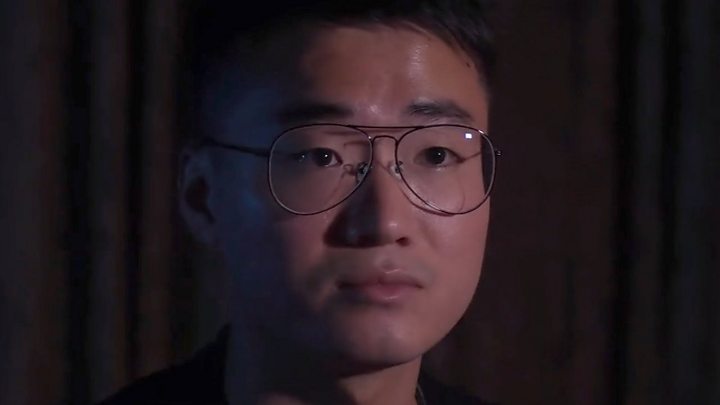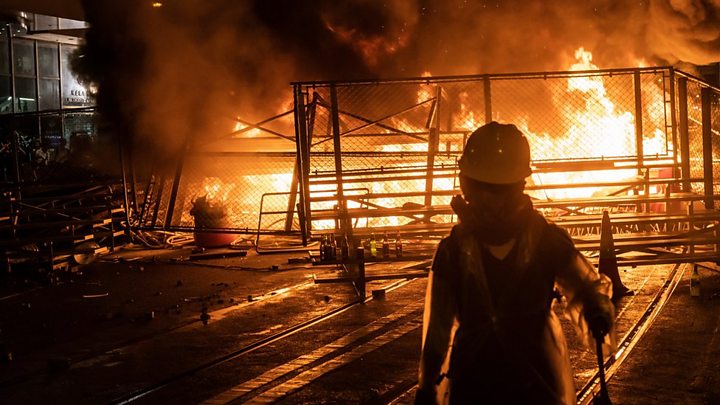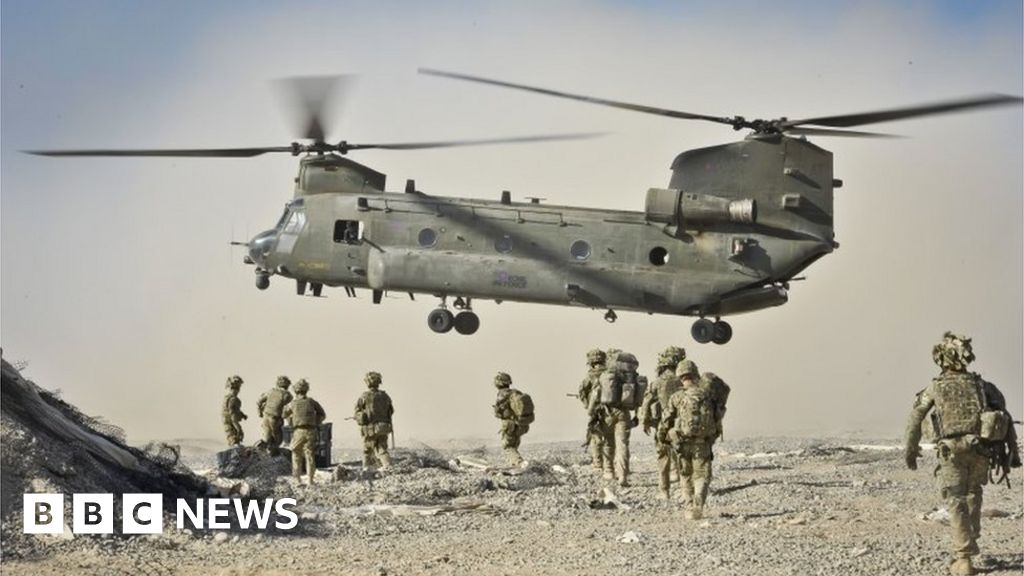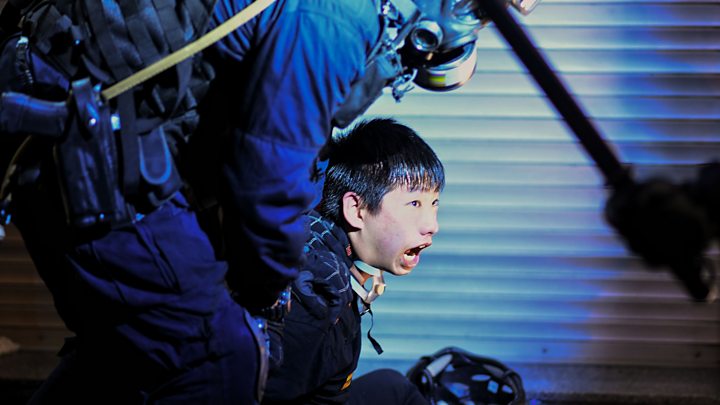
Media playback is unsupported on your device
A former employee of the UK's Hong Kong consulate has told the BBC that he was tortured in China and accused of inciting political unrest in the city.
Simon Cheng, a Hong Kong citizen who worked for the UK government for almost two years, was detained for 15 days on a trip to mainland China in August.
"I was shackled, blindfolded and hooded," the 29-year-old tells me.
UK government sources say they believe his claims - of being beaten and forced to sign confessions - are credible.
Following our interview, the British Foreign Secretary Dominic Raab has now summoned the Chinese ambassador.
"We are outraged by the disgraceful mistreatment that Mr Cheng faced when he was in detention in mainland China... and we've made clear that we expect the Chinese authorities to review and hold to account those responsible," Mr Raab told the BBC.
The Chinese authorities have not responded to the BBC's request for comment, although state media have previously suggested that Mr Cheng was detained for soliciting a prostitute.
His account now challenges that version of events and raises questions for both the Chinese and the UK governments.
The claims he makes - including that he saw other Hongkongers in Chinese custody - are likely to fuel protesters' fears that their city's freedoms are being eroded under Chinese rule.
"They said they work for the secret service and that there are no human rights," he tells me. "Then they started the torture."
Who is Simon Cheng?
As a trade and investment officer at the UK consulate, Simon Cheng's particular brief was to drum up interest in investing in Scotland among the Chinese business community.
It required him to travel frequently to mainland China.
But in June, with Hong Kong engulfed in mass demonstrations, Mr Cheng volunteered for an additional role.
"The British Consulate instructed staff to collect information about the status of the protests," he says.
As a supporter of the pro-democracy movement he found it easy to blend in and, with the consent of the consulate, he signed up to some of the social media groups through which the protesters co-ordinated their actions.
Paid overtime for the information he gathered, he began reporting back what he saw to his colleagues.
His task, both Mr Cheng and UK government sources insist, was not to direct events in any way but to purely observe - the kind of civil society monitoring work many embassies do.
But China had already begun to accuse the UK of meddling in Hong Kong, with British politicians becoming increasing vocal in their support for the protesters.
On 8 August, with emails still on his phone linking him to that work observing the protests, he was sent by the consulate to a business conference in the Chinese city of Shenzhen.
He didn't know it, but his life was about to change forever.
How did he disappear?
Although China has ruled Hong Kong for more than 20 years, the border between the city and the mainland still looks and feels like an international boundary.
The "one country two systems" principle - that the protesters say they are fighting to preserve - is meant to ensure that Hong Kong retains control over most of its affairs, including its borders.
But Simon Cheng was about to discover for himself the blurred edges of that legal and political framework.
Since the opening of the Hong Kong-Shenzhen high-speed rail link last year, a new border post has been placed inside West Kowloon station, in the heart of Hong Kong.
It is deeply controversial: Hong Kong's pro-democracy movement views the presence of the Chinese police, manning the Chinese side, as an unwelcome extension of Chinese authority.
It was here they stopped Simon Cheng, returning from his business trip.
He was put on a train, transported back to Shenzhen and handed over, he says, to three plainclothes officers from China's National Security Police.
How does he describe his ordeal?
Raising his arms above his head Mr Cheng shows me how he was hung up from the chain linking the handcuffs on his wrists.
The questions focused on his involvement in the protests with the aim, he says, of forcing him to confess to fomenting unrest on behalf of the British state.
"They wanted to know what role the UK had in the Hong Kong protests - they asked what support, money and equipment we were giving to the protesters."
He says he was made to hold stress positions - squatting against a wall for example - for hours on end, and beaten if he moved.
"They would beat the bony parts, like my ankles... or any vulnerable part."
He claims he was subjected to sleep deprivation, with his interrogators forcing him to sing the Chinese national anthem to keep himself awake.
And, he believes, he was not the only Hongkonger undergoing such treatment.
"I saw a bunch of Hong Kong people getting arrested and interrogated. I heard someone speak in Cantonese saying: 'Raise your hands up - you raised the flags in the protest didn't you?'"
Background to the Hong Kong protests
From a large pile of more than 1,000 photographs of Hong Kong protesters, he says, he was told to jot down the names and political affiliations of anyone he recognised.
"The secret police clearly stated that batches after batches of Hong Kong protesters had been caught, delivered and detained in mainland China."
Strapped to a chair and held by his hair, he says they tried to force him to open his mobile phone using the facial recognition function.
Once they'd gained access, they printed off the emails detailing the information he'd passed to the UK consulate about the protests.
"I told them I want to make it 100% clear, the UK didn't assign resources or help with the protests," he tells me.
But it was no use. Eventually, they made him record two video confessions, he says, one for the "betrayal of the motherland" and another for "soliciting prostitution".
Why was he detained?
The detention of a local employee of a foreign embassy or consulate is a relatively rare event.
The last high-profile case involving the UK was the arrest in 2009 of a number of Iranian employees at the British embassy in Tehran. They were accused of playing a significant role in that year's violent demonstrations - an accusation that finds echoes in Simon Cheng's account.
As in his own case, locally-employed staff usually have no diplomatic protection, potentially making them soft targets for intelligence gathering.
But Mr Cheng may have been targeted for other reasons.
He tells me he had a mainland Chinese friend who'd been arrested for taking part in the Hong Kong protests and was now on bail there.
During his business trip to Shenzhen, without the knowledge of the UK consulate, Mr Cheng had met the relatives of this friend to collect money for his living expenses.
Any mainlander known to have joined the pro-democracy demonstrations would be at risk of being placed under Chinese surveillance.
Although collecting money for a friend in legal difficulty is unlikely to constitute a crime, even in China, it could well have placed Mr Cheng under suspicion too.
I ask him what he thinks is the most likely reason for his detention - his position at the UK consulate, or his friendship with this mainland Chinese protester?
"Until now I have no idea," he replies. "But I think both factors could be part of the reason."
Why was he released?
Alongside our interview, Mr Cheng has published his own detailed account of what happened to him.
In it, he says that on the 11th day of his detention his treatment suddenly improved, a date that he says coincides with the first international media reports about his disappearance.
UK government sources say that, behind the scenes, intense diplomatic activity was already under way to try to secure his release.
Of China's only public version of events - the allegation that he was placed in 15 days administrative detention for soliciting prostitution - Mr Cheng is dismissive.
"It was a tactic for secretly and arbitrarily incarcerating me for an even longer period, without interference from third parties."
In China, administrative detention is a penalty that can be imposed by the police, acting with no judicial oversight. And, he suggests, the circumstances of his arrest appear unusual.
Allegations of soliciting prostitution are normally dealt with in China as a routine matter by the local police. They are far less likely to be the concern of the Chinese border authorities in West Kowloon station.
Mr Cheng's written statement also mentions that, before his arrest, he stopped in Shenzhen for a massage.
I ask him directly if he paid for sex.
"I don't want to focus on the question of whether I solicited a prostitute, because that's exactly what they want," he replies.
"So, I just want to state clearly that I did nothing regrettable to the people I cherish and love."
Whatever the reasons behind the decision to release him, he says it came with a warning.
"They stated that if I receive media interviews and speak out [about] anything other than 'soliciting prostitution' publicly, I will be taken back to mainland China from Hong Kong."
The UK's Hong Kong consulate has since reviewed, and tightened up, its guidelines for local staff travelling on work trips to the Chinese mainland.
What will Simon Cheng do now?
Simon Cheng has told the BBC that he believes it is too dangerous for him to return to Hong Kong.
Initially, he was so concerned about his safety, he refused to allow the UK government to issue a statement condemning the way he'd been treated.
More personal stories from Hong Kong
And, as a result of his long interrogation at the hands of the Chinese secret police, the UK now sees him as a security risk.
He was asked to resign from his post, although UK sources say he was provided with support, including a two-year working visa for the UK.
"Our hearts are with Simon Cheng and his family," Dominic Raab, the British Foreign Secretary, told the BBC.
"From the outset my overriding concern has been to make sure that he's taken care of properly and he gets the support that he needs."
But Mr Cheng's written statement suggests he does not see the protection he's being offered as adequate and, he says, he's now seeking asylum anywhere he can feel safe.
While he faces an uncertain future, the political and diplomatic ramifications of his extraordinary testimony are likely to be significant.
The claims he makes will feed into the already frayed relations between the UK and China over the subject of Hong Kong.
China will face questions about the use of torture in its headlong search for proof of foreign interference.
The British government will face questions about whether it could have done more to protect Mr Cheng as well as its treatment of him since.
As for Hong Kong's protesters - who began their fight against an extradition bill that would have allowed suspects to be sent to China - Simon Cheng's story will confirm one thing above all else: that there is indeed much to fear from a justice system so at odds with their own.

Media playback is unsupported on your device
https://www.bbc.com/news/world-asia-china-50457262
2019-11-20 06:01:28Z
52780442172472



 Reuters
Reuters